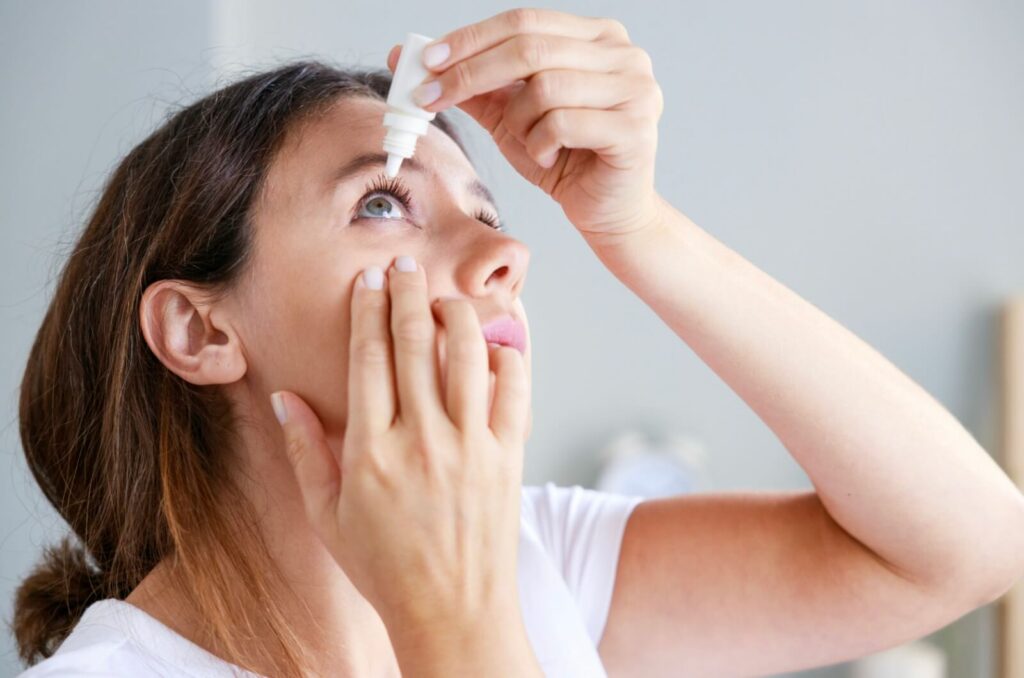Dry eye is a condition that occurs when the eyes do not produce enough tears or when the tears evaporate too quickly. It can cause symptoms such as itching, burning, redness, and blurred vision. Interestingly, dry eye may also be linked to headaches.
Dry eyes and headaches often coexist, but there’s no definitive evidence that one directly causes the other. Individuals with chronic migraines may be more prone to dry eyes, though the exact reason remains unclear. Both conditions can share triggers and symptoms like inflammation and light sensitivity.
While dry eyes can lead to eye strain, potentially resulting in headaches—especially in cases of digital eye strain or computer vision syndrome—the mechanism linking them isn’t clearly defined. Discomfort from dry eyes may cause squinting or tension in facial muscles, which could also contribute to headaches.
Addressing dry eye symptoms might help relieve headaches in some cases, particularly if both issues stem from the same underlying cause. However, the relationship between dry eyes and headaches is complex and varies from person to person. It’s advisable for anyone experiencing both symptoms to consult with an optometrist or healthcare professional for proper diagnosis and treatment.
Understanding the Link Between Dry Eyes & Headaches
As mentioned, there is no concrete evidence that dry eyes directly cause headaches. However, many individuals who suffer from chronic migraines or tension headaches also experience symptoms of dry eye.
Here are some possible explanations for the link between dry eyes and headaches:
- Shared triggers: Both dry eye and headaches can be triggered by factors like stress, lack of sleep, allergies, and hormonal changes. These triggers can cause inflammation in the body, leading to discomfort and pain in various areas.
- Overlapping symptoms: Many symptoms of dry eye, such as light sensitivity, blurred vision, and facial muscle tension, are also common migraine or tension headache symptoms. This overlap may contribute to confusion when trying to determine the underlying cause.
- Digital eye strain: In our modern world where we spend hours looking at screens, digital eye strain is a prevalent issue. It occurs when our eyes become fatigued from focusing on digital devices for prolonged periods, leading to dryness and discomfort. This strain can also contribute to tension headaches.
It’s essential to note that while there may be a link between dry eyes and headaches, they are separate conditions that require different treatments. Therefore, addressing dry eye symptoms alone may not completely alleviate headaches.
Managing Dry Eyes & Headaches

Treatment for dry eyes will vary depending on the underlying cause of the condition. Some common approaches include:
- Artificial tears: These over-the-counter eye drops can provide temporary relief for dry eye symptoms.
- Prescription medications: In cases of severe dry eyes, your doctor may prescribe medicated eye drops or ointments to manage symptoms. These may include anti-inflammatory drugs, or antibiotics.
- Lifestyle changes: Making adjustments like taking breaks from digital devices, using a humidifier, and staying well-hydrated can also help alleviate dry eye symptoms.
For tension headaches, some treatment options may include:
- Over-the-counter pain relievers such as ibuprofen or acetaminophen.
- Prescription medications: In more severe cases, a doctor may prescribe stronger pain relievers or muscle relaxants to alleviate tension headaches.
- Stress management techniques: Learning relaxation techniques such as deep breathing, meditation, or yoga can help reduce stress levels and ease tension headaches.
- Addressing underlying issues: If your headaches are caused by factors such as poor posture, eye strain from digital devices, or certain foods and drinks, making lifestyle changes can help prevent future occurrences.
Professional Treatment for Dry Eyes
In some cases, home remedies may not be enough to manage dry eyes. In these instances, seeking professional treatment from an ophthalmologist or optometrist may be necessary. Some common treatments that eye care professionals may recommend include:
- Punctal plugs: These small devices are inserted into the tear ducts to help keep moisture in the eyes.
- Intense pulsed light therapy (IPL): This non-invasive procedure uses pulses of light to unclog oil glands and improve tear quality.
- LipiFlow: A specialized device that applies heat and gentle pressure to clear blocked oil glands in the eyelids.
Finding Relief for Dry Eyes at Advanced Eyecare Optometry
Headaches and dry eyes can significantly impact our daily lives, making it essential to address these issues as soon as possible. While some home remedies and self-care practices can provide relief, consulting with a healthcare professional is crucial for more severe or chronic cases. By identifying the root causes of these conditions and following appropriate treatment plans, we can alleviate symptoms and improve our overall quality of life.
At Advanced Eyecare Optometry, our team of experienced doctors and staff are dedicated to providing comprehensive eye care, including treatment for dry eyes. If you’re experiencing chronic headaches or dry eyes, don’t hesitate to schedule an appointment with us today.




